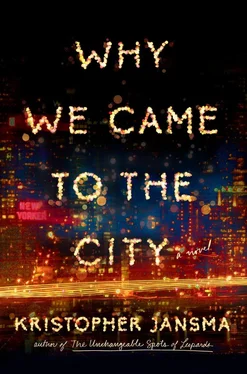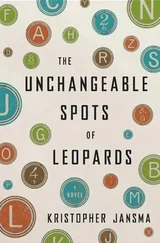The end nearest the window was relatively cleared of junk. It seemed to be a working area. Sketch pads lay open on a low coffee table, with pages covered by rough lines of blue ink. Against the paint-flecked walls of the apartment were perhaps a dozen paintings of different cities and landscapes, neatly stacked from smallest to largest. Badlands and prairie grass. Arching, shadowy bridges and marshes at twilight. An Albuquerque desert and an icy Alaskan plateau. Against the opposite wall were several half-finished collages and combines, made from odds and ends. Marbles, painted like eyeballs, were pressed into putty, numbers and bits of maps were connected by hairy bits of yarn, above a backdrop of still, mounted butterflies and gigantic death’s-head moths. It was all assembled on a heavy plywood base. William thought it looked like a corkboard belonging to an elegant serial killer.
William looked through a few of the dresses on the floor but couldn’t tell which, if any, were clean. He noted her size on one of the labels, thinking that if he just bought her a new one, he wouldn’t have to admit he’d broken in. Didn’t you have to put things away if someone was spraying for bugs? Wouldn’t it smell weird, only half a day later? The more he thought about it, the surer he was there had never been a pill fly infestation. But why had she lied to him? If she had just wanted to come over, she hardly had to make up a reason. She must have known that.
Just then he saw a box wrapped in white ribbon, with a card on top that said “For William.” He picked it up and gently shook it, but there was no rattling inside. What could it be? Should he have bought something for her? He wanted to open the box, but then she’d surely know he’d broken into her apartment, so he set it back down where he’d found it.
His eyes fell on a brass birdcage by the window that was filled with jewelry boxes. He stepped lightly over to the cage and carefully searched for any kind of door. Puzzled, he reached through the bars, but they were barely spaced enough for a single finger to go in and fish out an earring or a necklace.
“How the hell did you get the boxes inside?” he asked the empty room.
Then, just as he was about to back up again, he noticed a small book covered with soft black leather, wedged between two of the jewelry boxes. He tried to snag the book, but no matter how he tipped or turned it, it wouldn’t pass between the cage’s bars. Sweating despite the pervasive chill in the apartment, he stood on his tiptoes to try to make out what was inside. If he squinted, he could just see what appeared to be — yes, names and addresses! An address book! Perhaps, somewhere inside there was an entry for an Alissa or an Alicia or an Alis-ahh .
Where on Earth are you from? he asked as he tried to flip the pages through the bars. Who are you? Then the book slipped a bit from his hand, and a half-dozen black-and-white photographs slipped out and fluttered to the bottom of the cage. There were some old train ticket stubs in there too. William felt around to gather them. Baby photos? Old school photos? A bucktoothed, no-eared middle-schooler, not yet run away from home? William had to crane his neck awkwardly in order to see clearly, but by bracing his foot against the windowsill, he was able to inch upward a little further and get a good look at — Irene’s naked body.
William dropped the photos in his surprise, and they fell again, some now outside the birdcage, getting utterly and hopelessly out of order. Extracting his hand from the cage door, he bent over to scoop up the risqué photographs. Irene’s body was ethereal and light against dark sheets. The poses were seminatural and rather unpornographic. In one, her breasts were exposed but blurry, the focus on her lips and the tip of her nose, her eyes crossed daringly as she studied the ash trembling at a cigarette’s end. In another, she twisted sideways in a black river of sheets as if it were carrying her off. In a third, Irene lay with her back to the camera, eyes fixed out of a window, as if she were planning an escape. William could see the photographer’s apparently female hand reaching out at the bottom of the frame, as if trying to coax her back. He flipped the photograph over and saw handwriting — not Irene’s:
Tu es toujours sur le point de me quitter. — Alisanne
Alisanne! That was the thing, the name she’d been saying as she fell asleep. He fumbled with his phone a minute, typing the inscription into Google. It struggled a little until he found a second bar of signal closer to the window, at which point it spat out the result.
“You are always about to leave me,” he said aloud to no one.
William had had enough. He stacked the photographs together again as neatly as he could, slipped them into the back pages of the address book, and wedged the whole thing between the jewelry boxes again. It’s too much, he told himself, as he stepped out of the apartment. “It’s too much,” he said to himself. It’s too much. Shutting it all behind him, he trudged back down the half-collapsed staircase and pushed out onto the snowy sidewalks of East Fourth Street.
He made it all the way to Fifty-third Street before he changed his mind again. By Seventy-eighth, he saw a high-necked red dress in a shop window. He bought it and had it gift-wrapped.
• • •
Irene thought she’d never been happier than she was walking down the streets of suburban Flushing with William’s arm on her recently bandaged one, heading toward the home of Mr. and Mrs. Cho. William was flustered, she imagined because they were late. Still, she didn’t even mind that he’d asked her “How do you feel?” five times and “Are you feeling all right?” six times since she’d checked out of the hospital. For she was telling him the truth: she felt spectacular . In the eight hours she’d been stuck in the chemotherapy chair, she’d done five preliminary sketches for new sculptures, read six chapters of the Iliad (and William’s touching accompanying thoughts), and — the pièce de résistance! — had found a certain page twelve of the fall 2007 Pottery Barn catalog.
“ J’accuse! ” she’d cried, when he’d come to collect her at the end of the day. She’d flung the open catalog into his worried-looking face.
“How do you feel?” he’d asked, batting it away.
“I feel,” she said with a deep breath, “ incredible .”
William looked confused and studied the catalog a moment. “I don’t understand.”
“This is your apartment, William! What — did you just pick up the phone and call the eight hundred number and say, ‘Give me a page twelve, please’?”
He blushed again. “Not exactly, I—”
“William!” she cried, pulling at her hair with both hands. The other patients in the room were staring at them, delighted for a bit of real drama after several dull hours of talk shows. “William, you are a person ! You possess, within you, a person ality . A personality that can — no, which must —be expressed in the things that surround you!”
She lifted up his copy of the Iliad like a battle-ax.
“Listen to this, Mr. Cho! ‘If the gods actually know our fates and still try to meddle and wage their wars in us, then there must be some purpose in our choosing one of the many paths to that end. Man must have free will, or else why would the gods themselves bother?’”
“So?” he’d said. “Just some notes. They don’t mean anything.”
“They mean,” Irene shouted happily, “that you aren’t a page twelve, William Cho!”
This victorious cry still rang in her ears as she rushed arm in arm with William over the icy pavement, wearing the new red dress that he had bought for her as a Christmas gift. Somehow he had managed not only to select something she might have bought herself but also to get the proper size. She wondered if he had slyly checked the label on her clothes the night before as he’d undressed her, already planning this gracious surprise. And as he fumbled with the stack of gifts beneath his arm and hurriedly tried to warn her about his parents, she felt that he was her very own dark horse — that she would bring him out of himself and into the world, just as she had been herself, once.
Читать дальше












